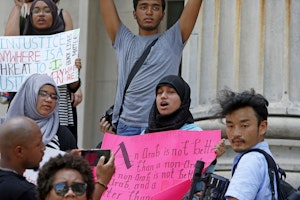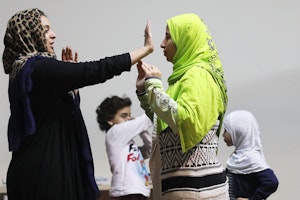Busting Silos and Building Solidarity
By Amardeep Singh

It had been 12 years since the terrorist attacks of September 11, but the discrimination directed at America’s Muslim, Arab, and South Asian communities was showing few signs of abating. In an effort to understand the needs of these communities, the Open Society Foundations and the Rise Together Fund commissioned a study to learn more. The results of the 2013 survey were clear and eye-opening: Organizations devoted to these communities felt isolated from the civil rights community as a whole. An intervention of some sort was needed, a way of building deep bonds between marginalized communities.
And so the Solidarity Summit was born. Initially conceived as a one-time gathering, the Summit has transformed into a regular three-day gathering of racial justice activists—Black, Latinx, Asian, Indigenous, Muslim, Arab, and South Asian—who tackle a wide range of issues, from immigrant rights to Native sovereignty to mass incarceration to ending the U.S. “Muslim Ban.” They share stories of the challenges they face, find the commonality in their struggles, and develop strategies for supporting one another in times of crisis and beyond.
It is not easy work. Historically, the U.S. mosaic has too often fractured and fragmented those who are marginalized. At the Solidarity Summits, participants laugh. They cry. They dance. They vent. And then they come together, to find new and better ways to connect their work and communities.
These dynamics were on display at the 2015 summit, held in Tennessee. We visited a mosque that had been an epicenter of anti-Muslim sentiment to help inform attendees about issues impacting Muslims in America. Tensions arose as summit participants discussed how they saw their respective challenges. But then the healing that is the vital work of these gatherings happened. After a later meeting with Black Lives Matter activists in Nashville, organizers from the group South Asians Leading Together pledged to do more to support the movement for Black lives.
In the years since the summits began, participants have made many such cross-cutting connections. As a result of their work together, Muslim leaders have traveled to Capitol Hill, supporting their Latinx colleagues at United We Dream in their advocacy on behalf of hundreds of thousands of young people confronted with the prospect of deportation. Young Black activists involved in the organization Million Hoodies for Justice have met with young immigrant rights activists to plan joint actions together. Sikh and Native youth associated with summit participants Sikh Coalition and Native American Rights Fund mapped out a joint retreat to learn more about the challenges facing their respective communities. And representatives of the ACLU and the Native American Rights Fund connected, joining forces to ensure that native perspectives are taken into account in federal lawmaking.
This year, the summit was held in New Mexico, on the Santa Ana Pueblo—sovereign Native land—where participants learned about local and national issues impacting America’s Indigenous people. Meanwhile, the healing work continued. Some of the summit participants had experienced sharp criticism in the press for their work, and had felt alone and without allies in their hour of need. Out of the heartfelt discussion arose a plan of action. A new communication channel was established, so that leaders of any community who suddenly found themselves under attack could quickly connect with their counterparts. Think of it as a rapid response mechanism for solidarity on demand.
The Summit has produced other initiatives as well. Deepa Iyer, a veteran South Asian American activist, responding to a call from attendees, developed SolidarityIs, a dynamic project that works year round to foster solidarity among racial justice advocates. She hosts a podcast featuring summit participants talking about their work. She’s developed a popular online school for activists, offers in-person trainings, and is developing a solidarity curriculum to publish in the coming year.
The theory of change undergirding the summits is that shared transformational experiences lead to transformational relationships, which over time lead to transformational change. Maybe that concept is easier to grasp if you picture this, a memorable moment from one of the summits: a Sikh from New Jersey, a Muslim from Los Angeles, and an Arab from Virginia enjoying themselves at a country music venue in Nashville. No one else in the place looked like this group. It did not matter. The music was good, toes were tapping, and the bonds of a multiracial, pluralistic America were being forged.
Until February 2021, Amardeep Singh was senior program officer for the National Security and Human Rights Campaign of Open Society-U.S..

